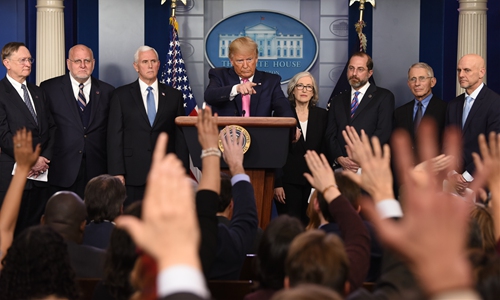HOME >> CHINA
Trump Pandemic rages
By Wang Cong and Xie Wenting Source:Global Times Published: 2020/3/22 16:18:40 Last Updated: 2020/3/22 22:18:40
US president assigns blame for own errors

US President Donald Trump (center) on February 26 appoints Vice President Mike Pence to oversee the country's response to the novel coronavirus outbreak. Photos: CNS photo
US President Donald Trump has spared no efforts in scapegoating China for allowing the coronavirus to rampage in the US, using an old trick from his political playbook: giving derogatory nicknames to his opponents. But with his latest attempt - calling the coronavirus "Chinese virus" -- Trump has run into a brick wall.
Not only did the term fail to catch on, as he clearly hoped, it has instead inspired many US citizens, from ordinary people to celebrities and Nobel laureates, to come up with what analysts call more accurate terms that keep the focus on the US president to take responsibility for his failure to stem the epidemic, such as "Trump Pandemic."
In a scathing opinion piece in the New York Times on Thursday, renowned Nobel Prize-winning economist Paul Krugman called the coronavirus outbreak the "Trump Pandemic" and argued that while the virus didn't originate in the US, "the [US] response to the threat has been catastrophically slow and inadequate, and the buck stops with Trump."
On Twitter, the term "Trump pandemic" was being widely used by many, including celebrities. US comedian Rosie O'Donnell, who has 1.1 million followers on Twitter, has used the term and others, including "Trump Plague." Joe Lockhart, a former White House press secretary under Bill Clinton, said on Twitter Saturday: "Trump Pandemic [-] as long as we're renaming things."
Many on Twitter have also been using other hashtags such as "Trump Virus" and "Trump Lies and People Die" in tweets criticizing the US President's bungled anti-epidemic efforts.
"'Trump Pandemic' is not only vivid but also very accurate," said Li Haidong, a professor of US studies at the China Foreign Affairs University in Beijing, noting that Trump's negligence and inaction caused the disaster. "The Trump administration has an inescapable responsibility for the current global pandemic."
Compared to the widespread opposition and condemnation of Trump's racist term from around the world, including US presidential candidate and former vice president Joe Biden and Mike Ryan, a senior official at the World Health Organization, the term "Chinese virus" has only been used by a small number of anti-China politicians, such as US Secretary of State Mike Pompeo and US lawmaker Tom Cotton, who has repeatedly spread conspiracy theories about the origin of the virus. These politicians have also been harshly criticized by many.
The widespread criticism from mainstream media and some Democratic politicians toward Trump was driven by the notion that Trump was trying to rally voters by "stirring up populism," said Sun Chenghao, an assistant research fellow at the institute of American studies in the Beijing-based China Institutes of Contemporary International Relations.
"In a moment of crisis, Trump definitely wants to intensify his populism to attract voters," Sun told the Global Times on Sunday.
In China, officials have also stepped up their efforts to counter the US government's attempts at scapegoating China. On Saturday, Hua Chunying, a spokesperson for the Chinese Foreign Ministry, offered her counterpart at the US State Department, Morgan Ortagus, via Twitter a chronicle of China's releasing of information to the US to counter some US officials' criticisms of China. These included a notice on the virus released by Wuhan authorities as early as December 31 and updates to the US authorities since January 3.
"Lying and slander won't make the US great, nor will it make up for lost time," Hua wrote in one of her five tweets directed at Ortagus, a rare public exchange between the spokespersons.
Trump's resorting to xenophobia and populist rhetoric ahead of the presidential election has not only drawn widespread criticism, but also intensified polarization and division among the US public, said Sun Chenghao, an assistant research fellow with the Institute of American Studies of the China Institutes of Contemporary International Relations in Beijing.
"Trump is accelerating the political polarization and division in the US and further turning the United States of America into the Divided States of America," Sun told the Global Times on Sunday.
Posted in: SOCIETY